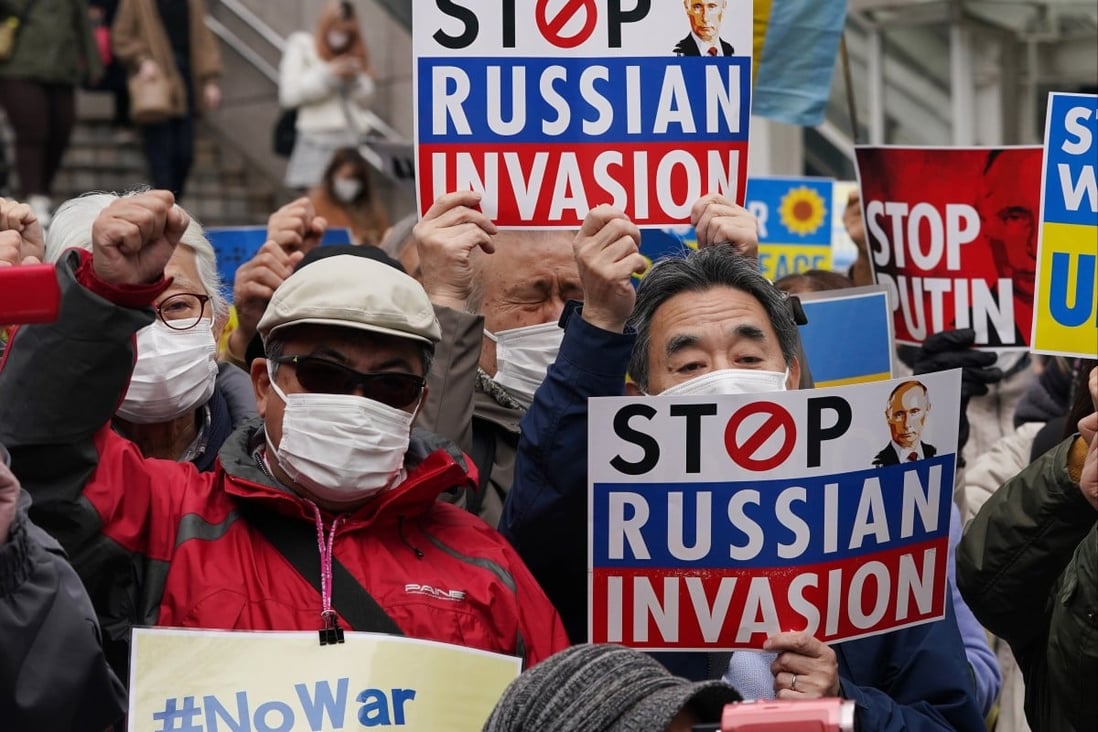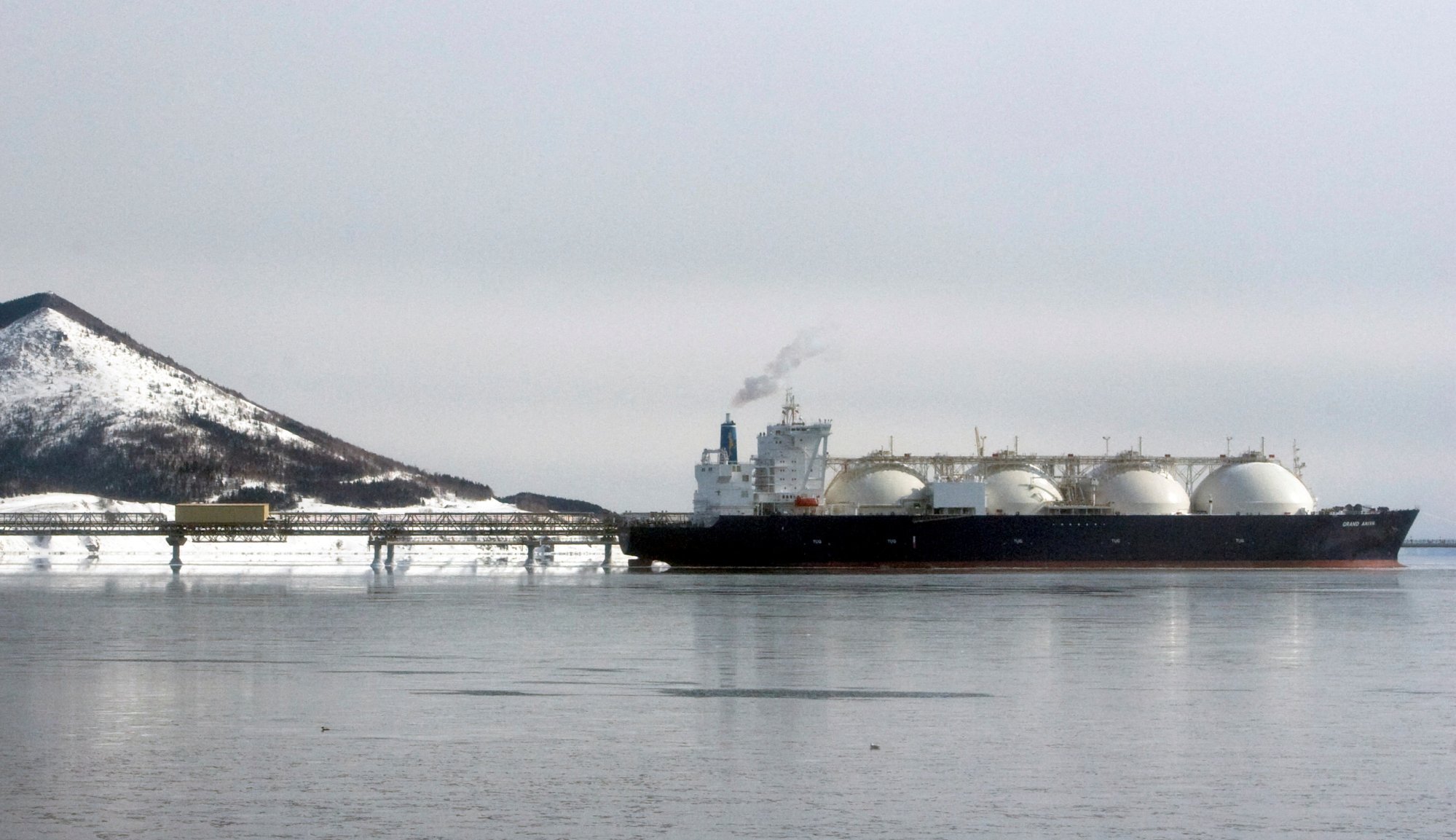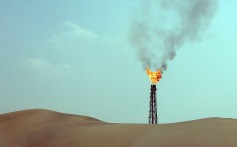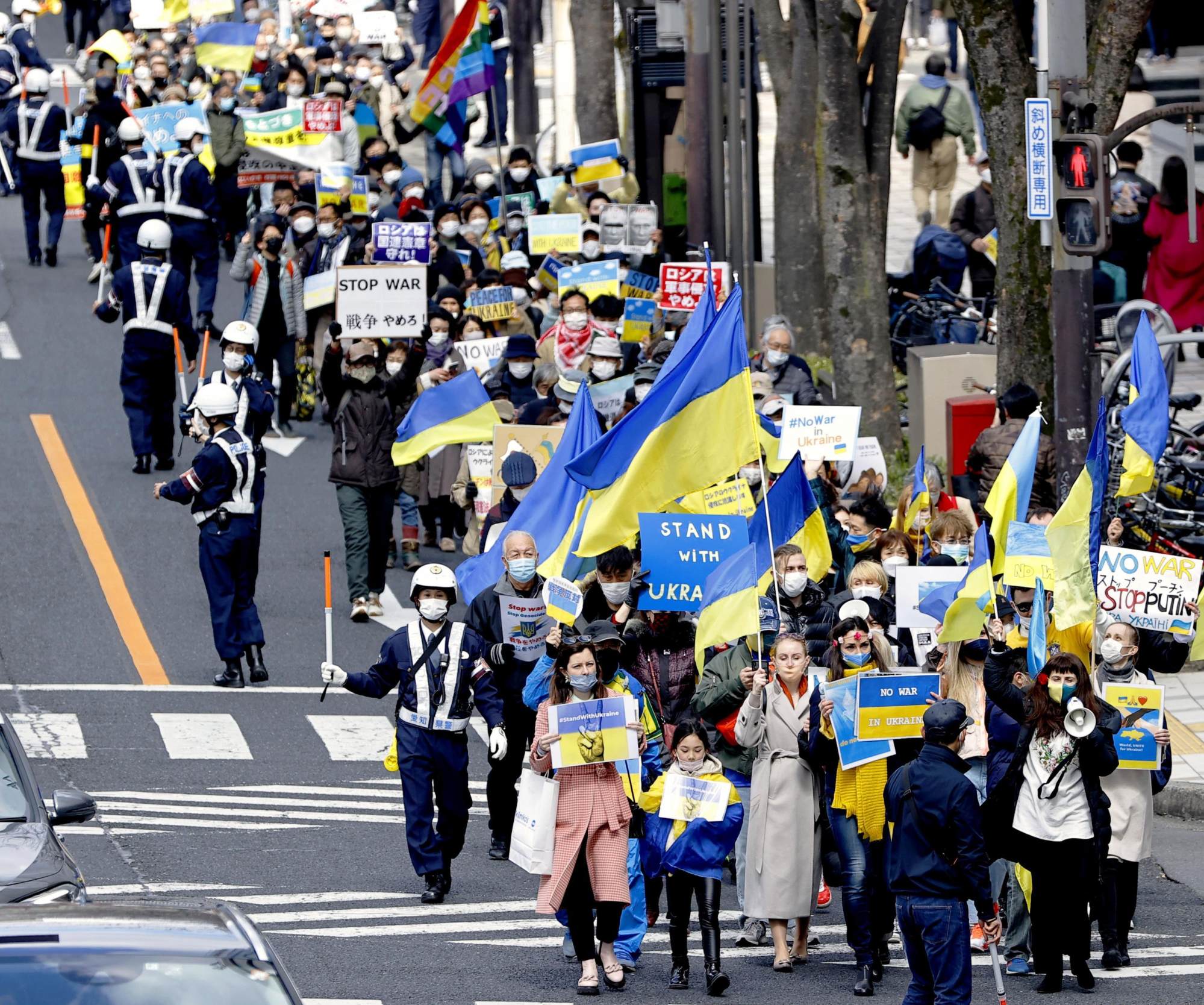FOCUS: Resource-poor Japan cautious about sanctions targeting Russian energy
共同通信社 15/03/2022
While some Western countries have been backing away from energy resources from Russia as part of sanctions over its invasion of Ukraine, resource-poor Japan is taking a more cautious approach due to its heavy dependence on energy imports
.

© 共同通信社
The United States announced earlier this month it will ban Russian oil and other energy imports in what is largely a symbolic move to punish Moscow over its aggression as Washington is not a major importer of Russian oil.
Britain also said that it will phase out imports of Russian oil by the end of the year.
But experts said it is not easy for Japan and its companies to follow suit, including giving up their stakes in the Sakhalin 1 and Sakhalin 2 large-scale oil and gas projects in the Russian Far East due to their importance to Japan's energy security.
Japan's energy self-sufficiency rate was as low as 11.2 percent as of fiscal 2020 through March 2021, according to Japan's Agency for Natural Resources and Energy.
Russia accounted for 3.6 percent of Japanese crude oil imports, and 8.8 percent of its liquefied natural gas imports in 2021, data from the Japan External Trade Organization show.
The response of the Japanese government and companies to the Sakhalin 1 and Sakhalin 2 projects has been in focus since oil majors Shell PLC of Britain and American Exxon Mobil Corp. announced ends to their respective involvements in them following Moscow's invasion of Ukraine on Feb. 24.
Japan's Sakhalin Oil and Gas Development Co., invested in by the government as well as trading houses Itochu Corp. and Marubeni Corp. among others, owns a 30 percent stake in Sakhalin 1.
Trading houses Mitsui & Co. and Mitsubishi Corp. hold a 12.5 percent and 10 percent stake, respectively, in the Sakhalin 2 project, in which Russian energy giant Gazprom PJSC has about a 50 percent stake. The joint venture produces most of Japan's gas imports from Moscow.
Hiroshi Hashimoto, head of the gas group at the Institute of Energy Economics, Japan, said he believes it is "unrealistic" for Japan to pull out of the Sakhalin projects in view of the potential blow to the Japanese economy and people's lives.
"Japan is in a different position from oil majors from other countries rich in their own resources," Hashimoto said, stressing the importance of the Sakhalin projects for stable energy supplies to Japan.
Japan has been promoting energy imports from Russia due to its geographical vicinity and the necessity to reduce its reliance on the Middle East. Sakhalin island, which hosts the two projects, is located north of Japan's northern main island of Hokkaido.
The Sakhalin 1 project, from which Exxon Mobil announced its withdrawal, was launched in 1995 and has been supplying Japan with crude oil since 2006.
Meanwhile, the Sakhalin 2 venture, the project exited by Shell, has an annual output capacity of about 10 million tons of LNG, with Japan, China and South Korea among the major importers. It began LNG exports in 2009.
Taisuke Abiru, senior research fellow at the Sasakawa Peace Foundation, said the Sakhalin 2 project is not "simply a corporate venture" for Japan.
"There have been concerns over the project in light of the risk to the companies' reputations. But Mitsui and Mitsubishi seem to recognize its importance in ensuring Japan's energy security," he said.
Both companies have said they will continue discussions about the project with the Japanese government and other relevant stakeholders.
Hashimoto said Japan would have to find alternative energy sources if it pulls out of the projects, which could lead to higher energy prices. The country might need to turn more to renewable energy or nuclear power generation, or ask people to save energy to make up for the loss.
Senior Japanese government officials and business leaders have also underlined the country's difficult position, expressing reluctance to reach a decision immediately.
Koichi Hagiuda, Japan's industry minister, said last week Japan should take a "wait-and-see" approach over joining Western nations in pulling the plug on the energy projects.
Prime Minister Fumio Kishida told a press conference earlier this month that ensuring a stable energy supply is a "national interest that must be protected with maximum" efforts.
He said a decision on the Sakhalin 1 venture, which involves the Japanese government given its stake in Sakhalin Oil and Gas Development Co., must be made following a sufficient assessment of the situation from the standpoint of stabilizing Japan's energy supply and security.
Hashimoto of the Institute of Energy Economics, Japan, said Tokyo must also consider when mulling pulling out of the projects whether companies from other countries would simply take Japan's place in the ventures, rendering the sanctions step ineffective.
As the Ukraine crisis continues, the world faces the issue of how to deal with Russia and how much they should depend on the country, Abiru of the Sasakawa foundation said.
"Russia is one of the largest natural gas and crude oil producers, so it is difficult to completely remove Moscow from the global economy in the short run," he said.
But for Japan, Abiru said, continuing participation in the two Sakhalin projects may bring benefits in the long run.
"The relationship between Japan and Russia has worsened due to the Ukraine crisis. But if the two countries continue energy cooperation, it may be a catalyst for improving ties in the future," he said.

The United States announced earlier this month it will ban Russian oil and other energy imports in what is largely a symbolic move to punish Moscow over its aggression as Washington is not a major importer of Russian oil.
Britain also said that it will phase out imports of Russian oil by the end of the year.
But experts said it is not easy for Japan and its companies to follow suit, including giving up their stakes in the Sakhalin 1 and Sakhalin 2 large-scale oil and gas projects in the Russian Far East due to their importance to Japan's energy security.
Japan's energy self-sufficiency rate was as low as 11.2 percent as of fiscal 2020 through March 2021, according to Japan's Agency for Natural Resources and Energy.
Russia accounted for 3.6 percent of Japanese crude oil imports, and 8.8 percent of its liquefied natural gas imports in 2021, data from the Japan External Trade Organization show.
The response of the Japanese government and companies to the Sakhalin 1 and Sakhalin 2 projects has been in focus since oil majors Shell PLC of Britain and American Exxon Mobil Corp. announced ends to their respective involvements in them following Moscow's invasion of Ukraine on Feb. 24.
Japan's Sakhalin Oil and Gas Development Co., invested in by the government as well as trading houses Itochu Corp. and Marubeni Corp. among others, owns a 30 percent stake in Sakhalin 1.
Trading houses Mitsui & Co. and Mitsubishi Corp. hold a 12.5 percent and 10 percent stake, respectively, in the Sakhalin 2 project, in which Russian energy giant Gazprom PJSC has about a 50 percent stake. The joint venture produces most of Japan's gas imports from Moscow.
Hiroshi Hashimoto, head of the gas group at the Institute of Energy Economics, Japan, said he believes it is "unrealistic" for Japan to pull out of the Sakhalin projects in view of the potential blow to the Japanese economy and people's lives.
"Japan is in a different position from oil majors from other countries rich in their own resources," Hashimoto said, stressing the importance of the Sakhalin projects for stable energy supplies to Japan.
Japan has been promoting energy imports from Russia due to its geographical vicinity and the necessity to reduce its reliance on the Middle East. Sakhalin island, which hosts the two projects, is located north of Japan's northern main island of Hokkaido.
The Sakhalin 1 project, from which Exxon Mobil announced its withdrawal, was launched in 1995 and has been supplying Japan with crude oil since 2006.
Meanwhile, the Sakhalin 2 venture, the project exited by Shell, has an annual output capacity of about 10 million tons of LNG, with Japan, China and South Korea among the major importers. It began LNG exports in 2009.
Taisuke Abiru, senior research fellow at the Sasakawa Peace Foundation, said the Sakhalin 2 project is not "simply a corporate venture" for Japan.
"There have been concerns over the project in light of the risk to the companies' reputations. But Mitsui and Mitsubishi seem to recognize its importance in ensuring Japan's energy security," he said.
Both companies have said they will continue discussions about the project with the Japanese government and other relevant stakeholders.
Hashimoto said Japan would have to find alternative energy sources if it pulls out of the projects, which could lead to higher energy prices. The country might need to turn more to renewable energy or nuclear power generation, or ask people to save energy to make up for the loss.
Senior Japanese government officials and business leaders have also underlined the country's difficult position, expressing reluctance to reach a decision immediately.
Koichi Hagiuda, Japan's industry minister, said last week Japan should take a "wait-and-see" approach over joining Western nations in pulling the plug on the energy projects.
Prime Minister Fumio Kishida told a press conference earlier this month that ensuring a stable energy supply is a "national interest that must be protected with maximum" efforts.
He said a decision on the Sakhalin 1 venture, which involves the Japanese government given its stake in Sakhalin Oil and Gas Development Co., must be made following a sufficient assessment of the situation from the standpoint of stabilizing Japan's energy supply and security.
Hashimoto of the Institute of Energy Economics, Japan, said Tokyo must also consider when mulling pulling out of the projects whether companies from other countries would simply take Japan's place in the ventures, rendering the sanctions step ineffective.
As the Ukraine crisis continues, the world faces the issue of how to deal with Russia and how much they should depend on the country, Abiru of the Sasakawa foundation said.
"Russia is one of the largest natural gas and crude oil producers, so it is difficult to completely remove Moscow from the global economy in the short run," he said.
But for Japan, Abiru said, continuing participation in the two Sakhalin projects may bring benefits in the long run.
"The relationship between Japan and Russia has worsened due to the Ukraine crisis. But if the two countries continue energy cooperation, it may be a catalyst for improving ties in the future," he said.

© 共同通信社
Japanese firms have largely taken a wait-and-see approach so far. Prominent companies are likely to feel more heat as Western investors pare back ties to Russia
Corporate executives say privately they are worried about reputational damage, as government officials hint Japan cannot just walk away from Russian energy
Reuters in Tokyo

People protest in Tokyo on Sunday against Russia’s invasion of Ukraine. Photo: EPA
Japanese firms are under deepening pressure over their ties to Russia and are scrambling to assess their operations, company and government insiders said, after Western rivals halted businesses and condemned Moscow for invading Ukraine.
While environmental, social and governance (ESG) investors have previously targeted companies in Japan for fossil fuels, scrutiny over Russia could become intense. Executives say privately they are worried about reputational damage, a sign corporate Japan is – however reluctantly – becoming more responsive to pressure on social issues.
Japan’s trading houses, commodities giants long seen as quasi-governmental arms integral to Japan’s energy supply, have big ties to Russia. Last year Russia was Japan’s second-biggest supplier of thermal coal and its fifth-largest of both crude oil and liquefied natural gas (LNG).

A Japanese-made liquefied natural gas (LNG) carrier is seen anchored near an LNG plant on the Russian island of Sakhalin. Photo: Reuters
“The energy issue has implications for national and public interest, so it has to be discussed properly with the government,” said one trading house insider, who like others spoke on condition of anonymity.
“But we also have to think about our corporate value and about how we explain this to our shareholders. It’s a difficult position.”
Gulf exporters stay neutral as Europe fears for Russian gas supplies
9 Mar 2022

Mitsui & Co and Mitsubishi Corp have stakes in the giant Sakhalin-2 LNG project Shell is now exiting. Itochu Corp and Marubeni Corp have invested in the Sakhalin-1 oil project that ExxonMobil is pulling out of.
Mitsui and Mitsubishi said they would consider the situation, together with the Japanese government and partners. Itochu and Marubeni declined to comment on their plans related to Sakhalin-1.
Japanese firms have largely said they are watching the situation. Those that have halted activity have tended to cite supply-chain disruption rather than human rights.
A senior executive at a carmaker said management at his company was holding daily meetings to gauge the impact of financial sanctions and the implication for parts supply.
“We’re also discussing reputational risk and how to deal with the news from the point of view of human rights and ESG – of course we’re aware of that,” said the executive.
“But we can’t just immediately decide we’re going to pull out because we can’t tell how long the Ukraine crisis will continue.”
Japanese firms typically do not face the same level of scrutiny from shareholders, customers, regulators and even their own employees that Western companies now confront, said Jana Jevcakova, the international head of ESG at shareholder services firm Morrow Sodali.
“Most Japanese companies still don’t have a majority of international institutional investors. Those that do will very shortly, or already are, feel the pressure.”
Reliant on Russia
A manufacturing executive said his company felt a responsibility to local staff in Russia but was also concerned about the risk of saying nothing.
“Japanese companies have been slow to react. Too slow. And I can’t agree with that,” he said. “If we keep quiet and just continue manufacturing and selling, we will likely face a risk to our reputation.”
Prime Minister Fumio Kishida has unveiled steps to help cushion the blow from higher oil prices, but it is unclear what the government will do about broader dependence on Russia. Japan’s imports from Russia totalled around US$11 billion in 2020.
Government officials say privately Japan cannot just walk away from Russian energy, even as they acknowledge the peril.

People march in the central Japanese city of Nagoya on Sunday to protest against Russia’s invasion of Ukraine. Photo: Kyodo
“If Japan remains invested in Russia, that itself runs the risk of drawing criticism” should the conflict be prolonged, said an official close to Kishida.
In a moment of rare outspokenness for the leader of a state-owned lender, the head of the Japan Bank for International Cooperation said last week that “it would not be right” for companies to stick to business as usual in Russia. Toyota Motor Corp and Nissan Motor Co have stopped exports to Russia, citing logistics issues, with Toyota halting local production.
Nissan, Mazda Motor Corp and Mitsubishi Motors Corp are all likely to stop local production when parts inventories run out, they say.
Japan’s most prominent companies are likely to feel more heat as Western investors themselves pare back ties to Russia.
Russian warships in waters off Japan in ‘warning’ over Ukraine

“We believe good corporate citizenship includes support of governmental sanctions, as well as closing down activities that might fall outside the current sanctions,” said Anders Schelde, chief investment officer at Danish pension fund AkademikerPension, which has US$21.3 billion of assets under management and US$342 million exposure to Japanese equities.
“From a financial point of view this might mean companies suffer short-term losses, but given the long-term stigmatisation of Russia that is likely, the long-term cost will not change much.”
No comments:
Post a Comment